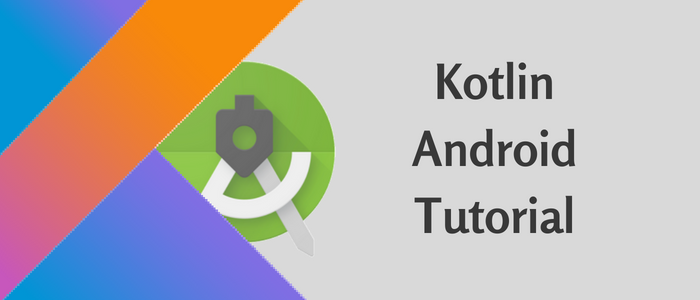Kotlin Android
Kotlin is a programming language that can run on JVM. Google has announced Kotlin as one of its officially supported programming languages in Android Studio; and the Android community is migrating at a pace from Java to Kotlin. So, you may see Kotlin code snippets in the forums or online discussions here after.
Learning Android development is very easy, given that you know the right direction and correct steps. Of Course Official Android Developer provides a rich documentation and examples which are helpful in easing the Android App Development. We here help you and guide you in taking those first little steps and master in developing your own Android Applications.
Lets get started!
Kotlin Android Tutorial
These Kotlin Android Tutorials are targeted for beginners who are enthusiastic and about to write their first Android Application or just playing around the basics of Android using Kotlin language. We shall also present you the capabilities and features provided by Android with examples and sample projects to make your Android Application Development easy and fun.

Prerequisites
We should know Kotlin programming language, have expertise to use an Android Phone, Windows/Ubuntu/Mac to follow the articles and examples for Android App Development using Kotlin language. If you would like to get a quick overview of Kotlin, refer Kotlin Tutorial.
Getting Started
To get started with Android Application Development, we have to setup the development environment. Download Android Studio for your Operating System and follow the below topics to create an Android application with Kotlin Support. If you already know Java and started building Android Applications with it, you may convert them to Kotlin using Android Studio. Also, we put forth some differences between Java and Kotlin with development.
- Basic Walk Through Android Studio
- Example Android Application with Kotlin Support
- Convert Java Files to Kotlin Files
- Kotlin vs Java for Android Development
- Using Java8 features for Android Development
Understanding the Android Terminology
Understanding the terms and widgets used in an application is like learning a new spoken language in a new geographical area. During the start, you may find some difficulty with the terms, Android community is speaking. We shall take you through a step by step process, with the help of many examples and sections created under Kotlin Android Tutorial.
Android Widgets
Android TextView
Android TextView is a basic user interface element that helps you display text to the user. Following Kotlin Android Tutorials take you through : Implementation of a simple TextView to display Hello World; To create TextView dynamically through programming and set a listener to it to respond for a click on the TextView; To get acquainted with some of the properties of TextView like color, font size, background, layout options, etc.
- Kotlin Android TextView
- Kotlin Android TextView Example
- Kotlin Android – Create TextView programmatically
- Kotlin Android TextView – Set OnClickListener
- Kotlin Android TextView – Text Color
- Kotlin Android TextView – Italic Text
- Kotlin Android TextView – Bold Text
- Kotlin Android TextView – Justify Text
- Kotlin Android TextView – Selectable Text
- Kotlin Android TextView – Shadow Effect
- Kotlin Android TextView – Center Align Text
- Kotlin Android TextView – Left Align Text
- Kotlin Android TextView – Right Align Text
Android Button
Buttons are present in most of the User Interface applications. Android provides Button as a User Interface element wherein a user can tap on it or click for triggering an action. Following Kotlin Android Tutorials help to get started with Android Button, create a Button dynamically through programming and add it to the user interface layout, set an action listener to it to listen for clicks, change some of the default properties like text color, text size, background, etc.
- Kotlin Android – Create Button programmatically
- Kotlin Android Button – Text
- Kotlin Android Button – Text Size
- Kotlin Android Button – Text Color
- Kotlin Android Button – Background Color
- Kotlin Android – Dynamically change Button Background
- Kotlin Android – Custom Design for Button Background
- Kotlin Android Button – OnClickListener
Android Toast
Toasts are helpful in showing some information about the operation the user has done or so for a moment and disappear. There are two timing options Toast provides : SHORT and LONG. It does not obstruct the current activity and wraps around the message being displayed as Toast. The current activity remains interactive and visible.
- Android Toast Example
- Change Toast text color and background
Android EditText
Android EditText is the user interface element through which you may request user to provide text input.
Android ImageView
Android ImageView is a View object that displays an image in Android Application.
- Andriod ImageView Example
- Android ImageView – Set Specific Height
- Android ImageView – Set Specific Width
- Android ImageView – Set Tint Color & Tint Mode
- Android Set OnClickListener for ImageView
Android LinearLayout
Android LinearLayout displays a group of children one after another vertically or horizontally.
- Android LinearLayout
- Android LinearLayout – Vertical Orientation
- Android LinearLayout – Horizontal Orientation
- Android LinearLayout – Center Align
Android RadioButtons
Android SeekBar
Android Snackbar
Android Snackbar is similar to Toast. In addition to displaying a message, an action could be set to Snackbar.
- Android Snackbar – Example
- Android Snackbar – Set Action
- Android Snackbar – Change Text Color, Background Color
Android ListView
Android RecyclerView
Android ActionBar
Android Programming – Other
Android – Text To Speech
Android Game Development
Android – Fix Errors
Android Example Applications
Android Fix Issues
Conclusion
Many examples and tutorials have been provided to learn Android Application Development using Kotlin programming language. You might have many ideas in mind or problems that you would like to solve using an Android Application. With the understanding of all the tutorials provided, you are good to start with the development of a nice Android Application of your own.
